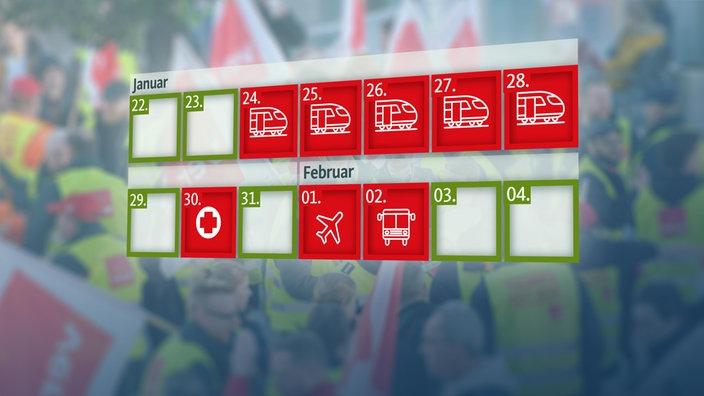This Friday, the trade union Ver.di has called for an almost nationwide warning strike in local public transport, which will also affect North Rhine-Westphalia. Negotiations will take place individually in each federal state, but according to Ver.di, similar topics such as reducing working hours with full pay compensation or shorter shifts will be negotiated in all federal states.
Following the five-day strike by the GDL at Deutsche Bahn last week, this is the third strike in the so-called critical infrastructure sector, in addition to the strike by aviation security at airports taking place today. The echo among middle-class politicians and the media is correspondingly great. As with the recent GDL strike, it is noticeable that parts of the German bourgeoisie and their media mouthpieces are vehemently demanding a tightening of the right to strike. At the forefront of these demands is currently the CDU with its internal party association "Mittelstands- und Wirtschaftsunion", which wants to push ahead with the legal regulation of strikes. What is remarkable here is not only how aggressively the right to strike is to be undermined, but also how certain sections of the bourgeoisie consider it necessary to act as preventively and repressively as possible as soon as there is even the slightest hint of a combative mood in the air among sections of the working class.
Although gangster Chancellor Scholz has publicly rejected a legal regulation of the right to strike for the time being - not without nevertheless calling for the principle of social partnership and moderate action - parts of the ruling class do not feel represented by the traffic light and their chancellor, especially in these times of crisis. For example, the Mittelstands- und Wirtschaftsunion and its chairwoman Connemann are calling for industrial action in critical infrastructure to only be possible after arbitration in future. This means that Deutsche Bahn workers or airport staff currently on strike would only be allowed to strike if union leaders and company bosses do not reach an agreement beforehand with the help of state arbitrators. In addition, Connemann wants a statutory emergency service and a ban on strikes on public holidays. These demands, which have the backing of both Jens Spahn and Friedrich Merz, are now being taken up in almost all major liberal-conservative newspapers and public sector media. In NRW, it is CDU Minister President Hendrik Wüst who is the state chairman of the Mittelstands- und Wirtschaftsunion.
What these demands essentially express is a fundamental interest of the German bourgeoisie, which Connemann deputy Schimke summarizes well on Deutschlandfunk radio when she says: "We want peace in this country, we want social peace. And what we are finding (...) is that there is an incredible potential for conflict, an incredible dissatisfaction." As these demands are suitable for creating "peace" in the sense of the bourgeoisie and preventing any strike in critical infrastructure, i.e., infrastructure that is strategic for the bourgeoisie, in advance or reducing it to absurdity. Critical infrastructure here means above all railways and airports, which are essential for the transportation of goods and are particularly vulnerable to economic damage as a result of strikes.
That is why Westdeutscher Rundfunk also asks:"Have the German trade unions really lost their sense of proportion? Are they ruthlessly fighting for the interests of their members in the middle of the recession - at the expense of the general public?" Whereby the talk of "the general public", just like that of social partnership, is again only intended to conceal the class antagonisms between workers and capitalists. Because "at the expense of the general public" here means the economic damage to capital. A labor dispute led by a combative trade union is nothing other than a collective means of struggle through which improvements are extorted from the exploiters with economic damage.
Source of the cover image: https://www1.wdr.de/nachrichten/streik-deutschland-eu-vergleich-100.html











